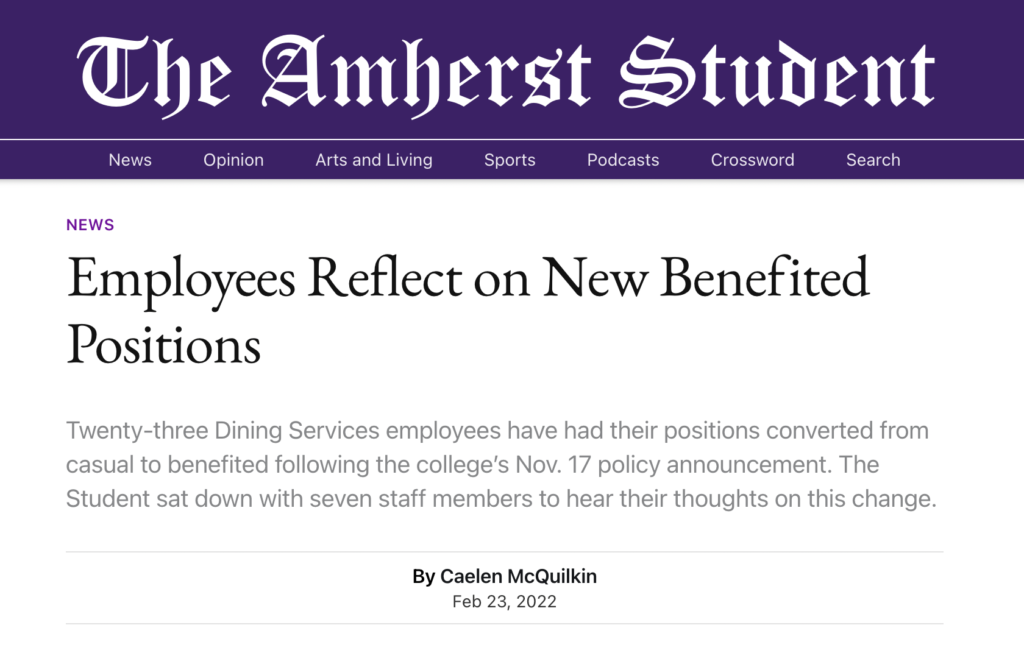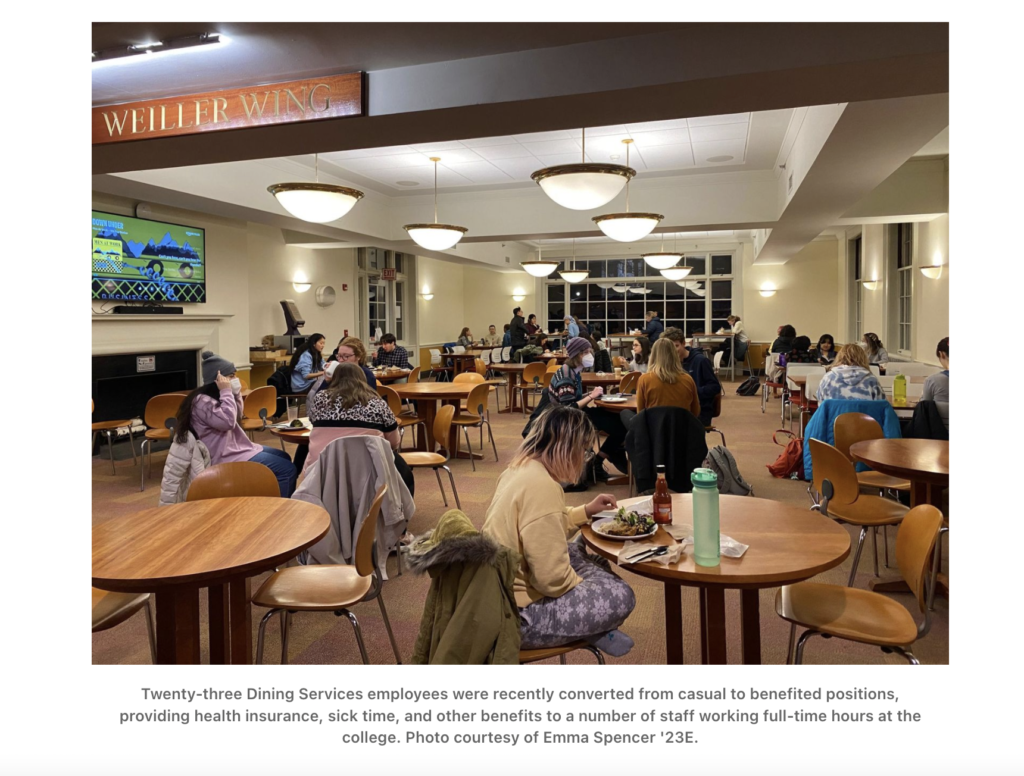Published in The Amherst Student on February 23, 2022


Following President Biddy Martin’s Nov. 17 announcement of the college’s new plan to convert a significant number of its casual employees to benefited positions, 23 Dining Services employees have had their positions converted from casual to benefited. These employees have since received a wage increase, as well as the entire range of employment benefits that the college offers, including health insurance, dental insurance, and paid vacation and sick time.
According to the college’s Staff Handbook, casual positions are defined as “those which at the time they are established are not expected to be part of the regular staff of the department,” with casual employees “usually employed for less than 20 hours a week.” However, in an investigation last fall, The Student found that many “casual employees” were working far above the 20-hour mark in key, non-temporary staff positions without benefits.
“Casual staff who are serving in these high hour-per-week roles will have the option of accepting the benefited position, and we expect that most will,” read Martin’s Nov. 17 announcement. “However, some may wish to retain a more flexible relationship with the College; we will respect that choice, of course, and allow them to remain in casual roles.”
In a joint statement to The Student, Director of Dining Services Joe Flueckiger and Chief of Campus Operations Jim Brassord reported that Dining Services now has 86 total full-time staff with benefits (not including managers), up from 63. The number of active casual staff — which Brassord and Flueckiger defined as part-time employees working less than 20 hours per week — has been reduced to 29.
With the goal of understanding this policy shift and its impacts on staff members at the college, The Student spoke with seven employees in Dining Services: a combination of longtime benefited employees, former casual employees who recently became benefited, and current casual employees. All sources opted to remain anonymous in order to maintain a comfortable relationship with management at work. Every employee interviewed expressed appreciation for the introduction of benefits for employees working full-time hours, emphasizing how significant the support of these benefits has been. Many also testified, however, that while the new policy — which enforces that casual employees cannot work more than 20 hours a week — has been beneficial, it has also meant that casual employees who were not converted to benefited positions have had their hours cut.
A Welcome Change
One employee, who will be referred to as Employee A, started working 40-hour work weeks at the college in September 2021 as a casual employee. They were converted from casual to benefited status in the policy change this past November, and expressed that they are “glad that the college was able to make that change and offer [benefited positions].”
“When I first heard about [the policy change], … what I heard was that students were pushing for … staff [to] get full-time benefited job[s],” Employee A said. “It was in the air, … and I was psyched and I was like ‘Oh, I hope I get offered it.’ I ended up getting offered the position, and for me it both changed and it didn’t change [things] … I was already doing 40 hours. The thing that did change was that … I felt like my work was being appreciated more … and I was able to have the same benefits as everyone else.”
Many of the other employees who received benefits after the policy shift expressed excitement and appreciation for the change as well.
Employee B, who was also converted to a benefited position in November, reflected: “For me, personally, it has been a great transition. I’m getting really amazing health insurance and the college matches into a retirement fund, which — for the wage I’m being paid — would seem impossible elsewhere.”
Employee C, who believes they are one of the oldest employees working in Dining Services, has been working at the college since around 1987. They were converted to a benefited employee in the transition and said that they are happy overall, especially about the increase in wages. Employee C also emphasized the importance of being able to add money to a retirement plan, and how vital that is to employee well-being.
In thinking about the newly offered benefits as a whole, Employee A reflected on the significance of paid holiday and sick leave time.
“Those benefits do help a lot,” they said. “Sometimes it’s very long days here at work, and it gets really busy. … I feel like everyone deserves just a personal day. … Those things actually do help us, just to recuperate, you know?”
Other employees expressed their satisfaction with the step this change takes toward fixing a dysfunctional labor structure at the college.
“When I first started [working at Amherst], when I was seeing that the casuals were working 40 hours, I thought to myself, ‘What? Why aren’t we able to have those benefits?’” said Employee A. The Student found last fall that on one given week, front-of-the-house dining staff (those not working in the kitchen or on food prep) worked approximately 1,100 hours of labor, of which approximately 50 percent were filled by benefited employees and 50 percent by casual employees.
“I just feel like we all do the same thing, and we all put the same time and effort,” said Employee A. “Now it’s changed a lot. … We — including me — have the new full-time benefited jobs.”
In a joint statement to The Student, Director of Dining Services Joe Flueckiger and Chief of Campus Operations Jim Brassord called the change a “win-win scenario for the staff and the college.”
“This shift represents a significant investment by the college in our Dining Program and in our staff,” they wrote. “Martin made this employment model a priority in support of staff. Her commitment to this initiative has given our Dining Program a more stable employment model.”
Consequences for Remaining Casual Employees
Employee A recounted that after the initial announcement of the policy change, dining staff met individually with managers to discuss their schedule and whether they would be interested in accepting one of the newly created benefited positions.
After these shifts were made, according to Brassord and Flueckiger, the remaining casual employees working in Dining Services are “often high school students, or occasional staff for catered events. Also included are some staff who chose not to accept full employment.”
Because the conversion to benefited positions occurred based on hours worked per week, however, employees said casual employees who were not working a full 40 hours already, but still worked more than 20 hours a week, were left at an odd in-between. Since casual employees could no longer work more than 20 hours per week, employees had to choose between cutting their weekly hours or finding work elsewhere.
“I think reducing the hours of the casuals is probably an okay thing, but I think it should have been more flexible instead of a hard 20-hour limit, like you can work between 20 and 25 or 30 hours,” said Employee B. “If I hadn’t been offered a full-time spot, that would have put me in a bad position and [I] would have had to look for work elsewhere. Most of the casuals at this point are retired or are in school and just need a little something to make money, which is fine. It just kind of stinks [that] if they wanted to work more, they can’t.”
All staff who chose to remain in their casual position are still employed with the college, Brassord and Flueckiger said. “We never intended for this initiative to displace staff. The idea has always been to promote and retain staff.”
Casual employees still working at the college reported that over January term, several had their hours cut due to the lower numbers of students on campus.
“The changes … it hasn’t helped … in my case,” said an anonymous employee, Employee E, who has worked less than 20 hours per week as a casual employee for several years now. “I didn’t get the proper heads up about what would happen with J-term, and being put out of work from before Christmas until early February, I was left with nothing. Nothing to do, really.”
Employee E was able to keep up with bills and rent, but remarked that “providing for myself, it’s hard. It was very limited. I tried to find a second job, but that [was difficult] as well.”
Employee A corroborated this account, saying that the casuals who were not converted “had a whole change that they weren’t expecting.”
“They weren’t expecting the change of schedules hours-wise, and the shorter days,” they said. “I know there’s another [employee] downstairs, … I believe [they] weren’t a 40-hour employee, but [they] did have longer shifts — eight-hour shifts for three days — and I know [they] got [their] hours cut and [they] don’t really understand why.”
Adjustments in the Workplace as a Whole
The shift of so many casual positions to benefited ones has also affected dining hall operations. One former casual employee who was converted to a benefited job took the position to avoid having their hours cut and gain better pay and benefits. But this same individual is having a hard time adjusting to the position’s greater responsibility.
“You could say that we have to do a little bit more, and work on things a lot more. For example, for the line, I used to just serve … Now I have to do more in areas that you could say I’m not as comfortable in, for example, calling for food downstairs,” said Employee A. “That’s something that for me … I have to start getting comfortable with.”
Overall, the employees The Student spoke with expressed appreciation for a better work environment.
“I feel like it has changed a lot. Now we have more help … Before we kind of had to all work a little harder and figure out ways, and now I feel like it’s running a lot more smooth[ly],” said Employee A. “Now that we have things assigned, like who’s going to be where, it just makes it a lot easier on us to go, you know, and it’s not all over the place.”
Brassord and Flueckiger had similar thoughts. “The conversion has been a very welcome change for us. While the operation has not shifted, our reliance on temporary help has changed dramatically,” they wrote. “Previously, there has been more turnover and hence more effort on hiring each semester to fill positions. Now that this initiative has been implemented we have been able to focus more on our food service programming in advance of the semester.”
Reflecting more broadly, one staff member, Employee F, shared that this policy change marks an important step toward a better workplace environment, but is not an end to the struggle. Given the rising costs of living in the Amherst area, such as gas, another employee emphasized that the college needs to follow its wage increase for the converted employees with a wage increase for all employees.
“There’s still more that needs to happen to create a really great workplace,” said Employee F.